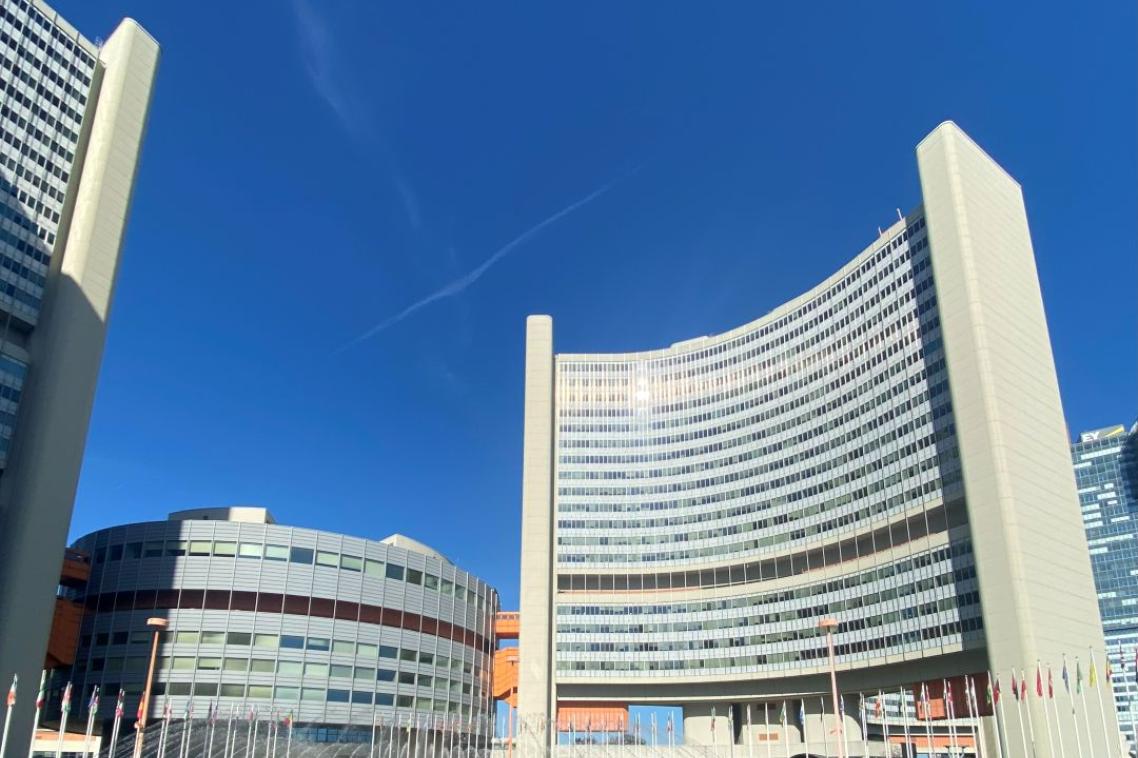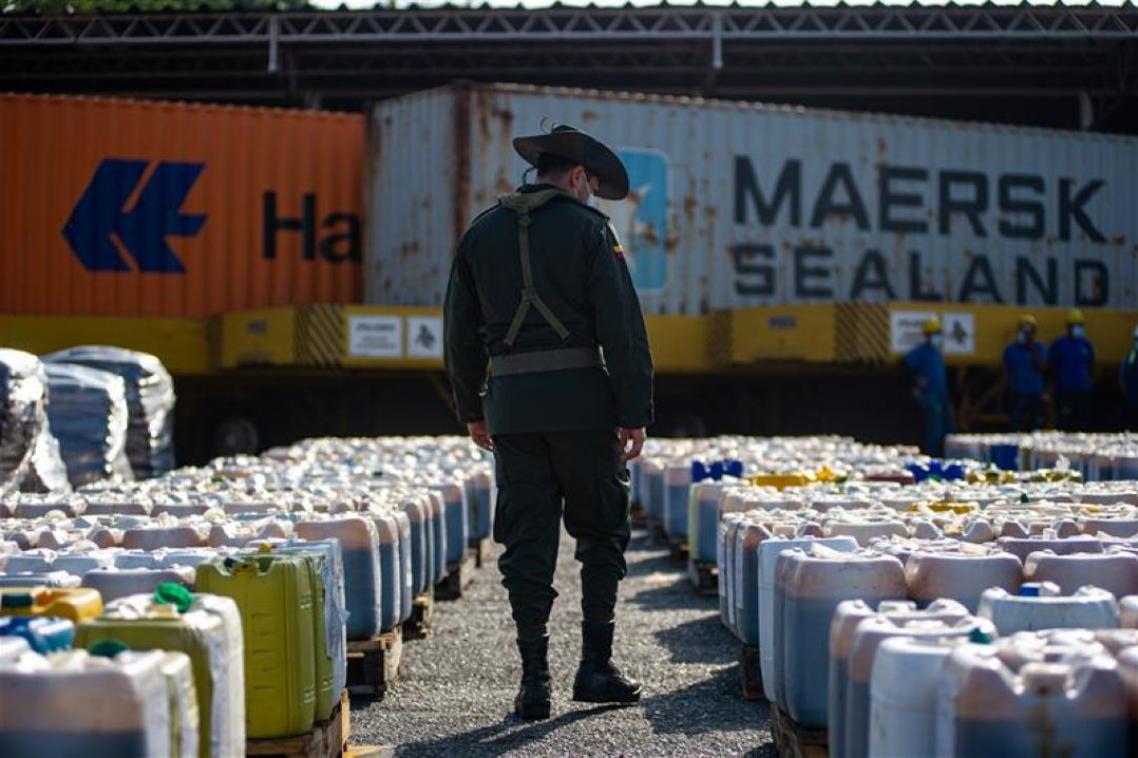Guns, drugs and smuggling – how UQ experts joined a global quest to fight organised crime

The United Nations headquarters in Vienna
(Photo credit: The University of Queensland )
Key points
- The United Nations Convention Against Transnational Organised Crime (UNTOC) was established amid concern about the growth of criminal organisations like the Mafia and Colombian drug cartels
- The illegal drug trade is considered by many to be the biggest challenge facing law enforcement agencies when it comes to targeting organised crime
- Operations involving the smuggling of migrants are benefitting from a dramatic increase of displaced people, many fleeing armed conflicts into countries with "closed border" attitudes
The United Nations Convention Against Transnational Organised Crime (UNTOC) was adopted on November 15, 2000, following lengthy negotiations.
Today, 192 States and the European Union are parties to the UNTOC.
The UNTOC is supplemented by 3 crime-specific instruments: the Protocol to Prevent, Suppress and Punish Trafficking in Persons, the Protocol against the Smuggling of Migrants and the Protocol against the Illicit Manufacturing of and Trafficking in Firearms and Ammunition.
Professor Andreas Schloenhardt from The University of Queensland Law School and the University of Vienna’s Professor Susanne Reindl-Krauskopf (also an Honorary Professor at UQ) participated in the negotiations at the UN headquarters in Vienna.
They reflect on their experiences and the achievements and challenges of the UNTOC and its protocols.

Andreas Schloenhardt and Susanne Reindl-Krauskopf.
(Photo credit: The University of Queensland.)
Q.What is UNTOC and why is it important?
Professor Schloenhardt: The UNTOC is the only treaty to fight organised crime in the world. It was set up at a time when the world had become very concerned about the growth of organised criminal groups like the Mafia and Colombian drug cartels and the scale of the illicit trade such groups were involved in.
When the UNTOC was developed, there was a big spirit of multilateralism – much more so than today – where countries realised a cross-border problem required a cross-border answer.
Professor Reindl-Krauskopf: I had no prior experiences with diplomatic negotiations, so it was interesting to see how difficult it was to find a consensus and a common goal on specific provisions.
The negotiations were so detailed – both on wording but even discussions on exactly where to put a comma.
And of course, such detail is necessary because there are so many different States with different backgrounds and different interests all coming together. It is a compromise – and making a good compromise takes time.
Q.What are the most serious issues facing the world when it comes to organised crime?
Professor Schloenhardt:
Drug trafficking
There is no question that the illicit drug trade, due to its immense scale and profits, remains the number one problem. We have a lot of data on drug trafficking that shows supply and demand continue to rise worldwide. Producing, transporting, and selling narcotic drugs and psychotropic substances is a very lucrative market.

Members of Colombia's anti-narcotics police seize a cargo of molasses mixed with cocaine.
(Photo credit: Sebastian Barros/Long Visual Press/Universal Images Group via Getty Images )
Smuggling of migrants
Second is the smuggling of migrants. There are around 120 million displaced people now – about twice the number we had 7 or 8 years ago. This is extraordinary. The demand for smuggling of migrants is fuelled by the absence of safe, affordable and regular migration pathways.
To make matters worse, the many armed conflicts the world is experiencing right now, coupled with the closed border attitude of many countries, plays into the hands of smugglers. The world is less compassionate now than it was in the past and so people resort to irregular means.
Smuggling of contraband
Third, and perhaps less prominent in the public perception, is the trafficking of various illicit goods such as wild fauna and flora, firearms and forged or pirated items.
All trafficking – and in fact, all organised crime – is demand-driven. Goods that are difficult to obtain on the legal market create opportunities for organised crime groups, especially when people are willing to pay premium prices.
Some of the demand comes from collectors and other buyers who want items that are unique and rare. This is the case for curio and ornaments made from rare plant and animal species, but also for works of art and antiquities that are traded illegally.
Organised crime seeks to maximise profits and so long as demand exists, criminal elements will find a way to provide the goods and services that consumers want.
Professor Reindl-Krauskopf: In this context we should also stress the important role of corruption. Organised crime could not exist on the level that it does without people willing to offer and accept bribes.
Organised criminal groups have the money to bribe officials at all levels of government, from low-ranking inspectors to high-ranking decision makers, as well as people in the private sector. Without corrupt officials and corrupt politicians, many of these networks would collapse.
Q. The US Military has been conducting strikes on boats allegedly transporting illegal drugs. Are governments becoming increasingly desperate to tackle the illicit drug trade?
Professor Schloenhardt: There is no way to defend or justify these strikes. It breaches all kinds of conventions and human rights standards.
The amount of money made in this industry and the number of consumers is higher than ever before. Indeed, we see this in Australia even more than in other countries.
With this in mind, I can see how the frustration of governments might be growing. We need to think about new ways to fight the so-called ‘war on drugs’.
What we have tried to do for the better part of the past 100 years is not working and is taking up a lot of law enforcement resources. Our prisons are full because of people committing drug-related offences. At the same time, there are more and more people consuming drugs – people who know full well about their illegality and the health consequences and are oblivious to the fact that they are supporting organised crime.
I do not have a simple answer to solve this complex problem, but indiscriminate killings of people suspected to be drug traffickers is not the answer.
Professor Reindl-Krauskopf: I do not have an easy solution to the problem either. The illicit drug trade is increasing but despite the sympathy one might have with the US Government’s frustration, we need to respect basic human rights principles and the fundamentals of the rule of law. If we start neglecting these guarantees and breaching them, this can set a very dangerous precedent. It could start a vicious circle: if you can’t handle a problem, then just skip the rule of law.
I think the process of measuring whether the interference with human rights is proportionate or not has shifted and that’s possibly a bit of a weakness of the guarantees.
Professor Schloenhardt: New ideas to tackle organised crime are always worth discussing.
Twenty-five years ago, the UNTOC and its Protocols set up a system of laws and law enforcement tools that many countries have yet to adopt and enforce.
There is much work left to do for people like us to promote the ideas and opportunities created by the UNTOC and to point out that laws and law enforcement need to evolve along with the ever-changing patterns of organised crime.
Topics
Related articles

National database of deaths in custody grows to more than 1200 people

‘High-impact sabotage’: spy chief issues grave warning about espionage and sabotage threat
Media contact
UQ Communications
communications@uq.edu.au
+61 429 056 139
